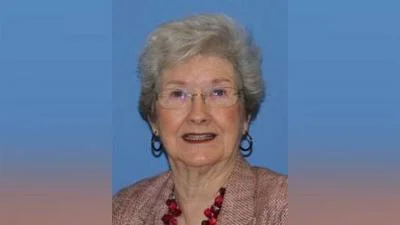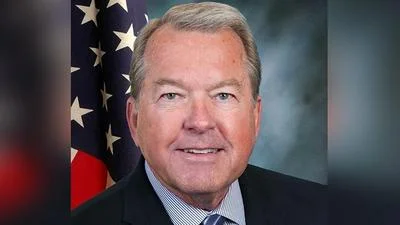Anna Moeller 43rd District in the Illinois House of Representatives | Official Website
Anna Moeller 43rd District in the Illinois House of Representatives | Official Website
According to the Illinois General Assembly site, the legislature summarized the bill's official text as follows: "Amends the Illinois Local Library Act. Provides that all libraries open to the general public in the State shall maintain a supply of opioid antagonists in an accessible location. Provides that any authorized personnel may administer an opioid antagonist to any person whom the authorized personnel believes, in good faith, to be having an opioid overdose (i) on library grounds; (ii) in the immediate vicinity of the library; or (iii) at a library-sponsored event. Requires libraries to ensure that during all operating hours, there is at least one person present in the library who has completed training in how to recognize and respond to an opioid overdose, including the administration of an opioid antagonist. Requires the Director of the Department of Public Health to identify organizations qualified to offer the training. Provides that the health department of any county where a Library is located may provide, either directly or through providing necessary funds, a supply of opioid antagonists to the library. Allows the Department to adopt rules to implement the provisions. Makes conforming changes in the Pharmacy Practice Act."
The following is our breakdown, based on the actual bill text, and may include interpretation to clarify its provisions.
In essence, this bill amends the Illinois Local Library Act to require all public libraries to maintain a supply of opioid antagonists, such as naloxone, in accessible locations. Authorized personnel, defined as trained employees or volunteers, are permitted to administer these drugs to individuals experiencing an opioid overdose on library grounds, in the immediate vicinity, or at library-sponsored events. Libraries are mandated to ensure at least one person present during operating hours is trained to recognize and respond to opioid overdoses. Training can be sourced from recognized organizations or developed using free online resources from the Department of Human Services or Department of Public Health. Libraries and their personnel are granted immunity from liability for administering opioid antagonists, except in cases of willful misconduct. The Director of Public Health may identify qualified training organizations and list them online. Public libraries are allowed to receive opioid antagonists from lawful sources.
Anna Moeller has proposed another two bills since the beginning of the 104th session.
Moeller graduated from Northern Illinois University in 1995 with a BA.
Anna Moeller is currently serving in the Illinois State House, representing the state's 43rd House District. She replaced previous state representative Keith Farnham in 2014.
Bills in Illinois follow a multi-step legislative process, beginning with introduction in either the House or Senate, followed by committee review, floor debates, and votes in both chambers before reaching the governor for approval or veto. The General Assembly operates on a biennial schedule, and while typically thousands of bills are introduced each session, only a fraction successfully pass through the process to become law.
You can read more about bills and other measures here.
| Bill Number | Date Introduced | Short Description |
|---|---|---|
| HB1910 | 01/29/2025 | Amends the Illinois Local Library Act. Provides that all libraries open to the general public in the State shall maintain a supply of opioid antagonists in an accessible location. Provides that any authorized personnel may administer an opioid antagonist to any person whom the authorized personnel believes, in good faith, to be having an opioid overdose (i) on library grounds; (ii) in the immediate vicinity of the library; or (iii) at a library-sponsored event. Requires libraries to ensure that during all operating hours, there is at least one person present in the library who has completed training in how to recognize and respond to an opioid overdose, including the administration of an opioid antagonist. Requires the Director of the Department of Public Health to identify organizations qualified to offer the training. Provides that the health department of any county where a Library is located may provide, either directly or through providing necessary funds, a supply of opioid antagonists to the library. Allows the Department to adopt rules to implement the provisions. Makes conforming changes in the Pharmacy Practice Act. |
| HB1785 | 01/27/2025 | Amends the Medical Assistance Article of the Illinois Public Aid Code. In provisions concerning PDPM STRIVE staffing ratio calculations for nursing facilities, provides that beginning January 1, 2025, the staffing percentage used in the calculation of the per diem staffing add-on shall be its PDPM STRIVE Staffing Ratio which equals: its Reported Total Nurse Staffing Hours Per Resident Per Day as published in the most recent federal staffing report (the Provider Information file), divided by the facility's PDPM STRIVE Staffing Target. Provides that each facility's PDPM STRIVE Staffing Target is equal to .76 times the facility's Illinois Adjusted Facility Case-Mix Hours Per Resident Per Day. Provides that a facility's Illinois Adjusted Facility Case-Mix Hours Per Resident Per Day is equal to its Nursing Case-Mix (as published in the most recent federal Provider Information file) divided by 1.4627 times 3.79 (which is the Reported Total Nurse Staffing Hours Per Resident Per Day for the Nation as reported in the January 2024 State US Averages file). Effective July 1, 2025. |
| HB1587 | 01/22/2025 | Amends the Nursing Home Care Act and the Specialized Mental Health Rehabilitation Act of 2013. Provides that residents of nursing home facilities have the right to outdoor access. Provides that residents of nursing home facilities and consumers served by mental health rehabilitation facilities shall be free to enter and leave the facilities as they choose. Provides that a facility may suspend this right only if the resident's or consumer's physician examines the resident or consumer and determines that leaving the facility would pose a danger to other residents or consumers or an immediate and substantial danger to the resident's or consumer's safety and well-being, which shall be explained to the resident or consumer and documented in the resident's or consumer's medical chart. |






 Alerts Sign-up
Alerts Sign-up